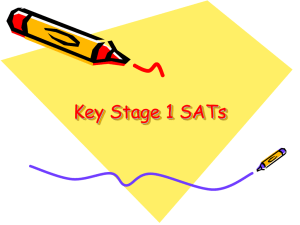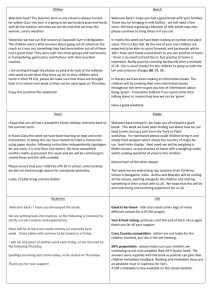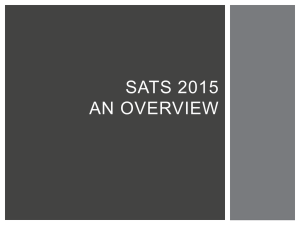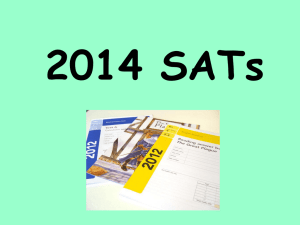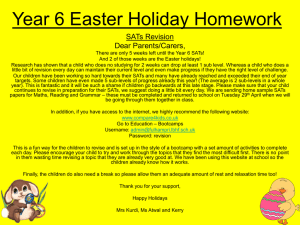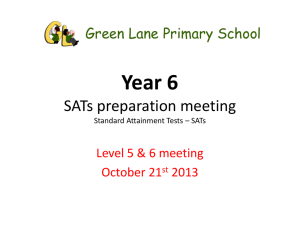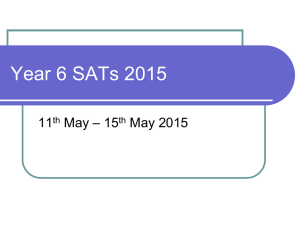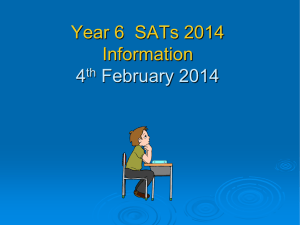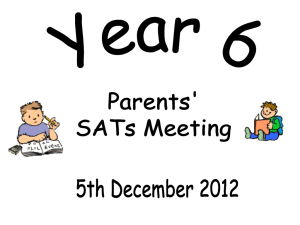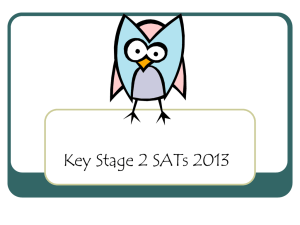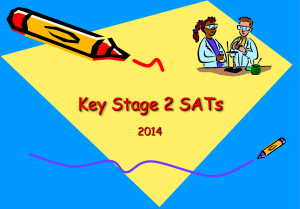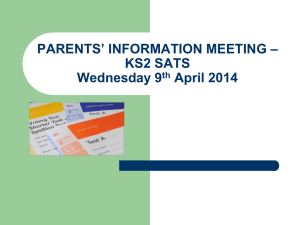Years 2 Sats Information for Parents
advertisement
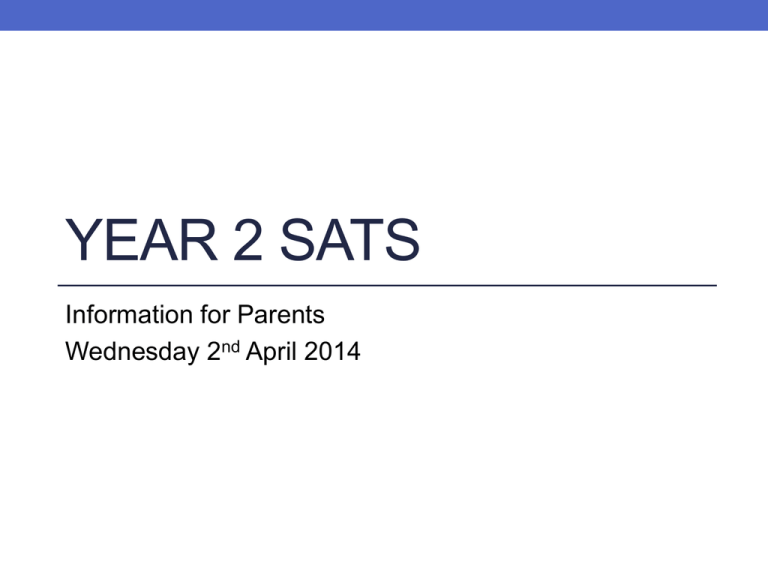
YEAR 2 SATS Information for Parents Wednesday 2nd April 2014 Outline of the Session • What are SATs? • An overview of the tasks and tests • Teacher assessment • Levels • The results • What can I do to help? What are SATs? • Statutory Assessment Tasks (Tests) • A measure of success • Children’s skills are assessed in Reading, Writing and Mathematics • Tests are used to inform Teacher Assessments. Overview of the Tasks and Tests • Tests take place in class room or in a quiet area if in a smaller group. • Enough time is given to complete the test. • Level 2 test is completed before moving to the Level 3 test. • Some children will be given a task to complete with a teacher instead of a test. Tasks and Tests Assessment Area Task and Test for 2014 Reading Reading Tests: Paper test and/or separate booklet Whole class or in groups, unlimited time, but usually 40-45 minutes Levels 2 and 3 Writing Spelling Test: Whole class or in groups Usually about 15-25 minutes Levels 1-3 Short Writing Task: Whole class or in small groups Whole class or in groups, unlimited time, but usually 25-35 minutes Levels 1-3 Reading Task: Sharing a book with a teacher, running record and discussion Individually, about 15-20 minutes Levels 1 and 2 Long Writing Task: Whole class or in small groups Whole class or in groups, unlimited time, but usually 40-45 minutes Levels 1-3 Mathematics Maths Tests: Paper test Whole class or in groups, unlimited time, but usually 40-45 minutes Levels 2 and 3 Maths Task: Questions with a teacher using resources and answer paper Individually or small groups, usually about 20-30 minutes Level 1 Overview of the Tasks and Tests • Reading Test: Level 2 paper with text and questions; Level 3 separate answer paper and booklet. Adults not allowed to read any part of the test. • Spelling: paper with pictures to label and a dictated cloze passage. • Writing: long and short tasks completed in class based on familiar genres and topics. • Mathematics: Level 2 and 3 paper, some resources are allowed e.g.100 square, tens and units cubes but not in all tests. Adults may read the question in a Maths test. Teacher Assessment • SATs are marked in school by class teachers. • Criteria and mark schemes are given and we follow national guidelines when administering and marking the tests. • Scores give a National Curriculum Level for the test. • Levels in SATs inform teacher judgements which are based on ongoing assessments: work in books, teacher observations, notes and ongoing records of attainment. • Teachers use national Level Descriptors when assessing. • Teachers have the discretion to award a Level according to the skills of the child across the curriculum, not just based on a one-off test score. • Teacher Assessments are moderated in school and by Local Authority moderators who visit the school. Have a go at some SATs questions... National Curriculum Levels W 1 2c 2b 2a 3 • W = Working towards level 1 • Each level has subdivisions: c – just entering the level, not yet secure b – secure in the level a– secure and moving towards next level • Level 1 and 3 subdivisions not shown on SATs results • Nationally agreed ‘age-related expectation’ for end of Year 2 is 2b. Results • National Curriculum Levels will be reported in English (Reading and Writing) and Maths. • Teachers also assess Science, but there is no SAT for Science. • National Curriculum Levels are used to track progress from Key Stage One to the end of Key Stage Two and beyond. • Teachers use the SATs results to inform teaching e.g. through analysing common errors. What Can I Do to Help? Reading • Read regularly, talk about the book, ask questions that go beyond literal recall. Writing • Practise spelling high frequency words and spelling patterns from phonics Phases 5 and 6 if children find them tricky. • Write when purposeful opportunities arise e.g. a letter to a family member, a postcard to a friend, a shopping list, an invitation, related to class reading book (see ideas bank). Mathematics • Find opportunities for your child to use numbers in everyday situations and encourage them to work out calculations in their head. • Practise addition and subtraction facts, times tables and related division facts. Learning • Do not go on holiday in term time. • Reasonable bedtimes so children are rested, alert and ready to learn. • Talk with your child about their learning in school. . THANK YOU! • A copy of this presentation will be available in the ‘Workshops’ area of the school website: • www.morley.cambs.sch.uk • ‘KS1 SATs’ leaflet contains more details. • Ideas for writing activities • Phase 5 and 6 Phonics information • Questions to ask when reading Individual concerns: please make an appointment with your child’s class teacher.
